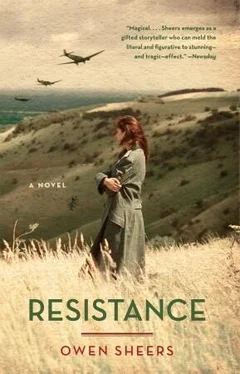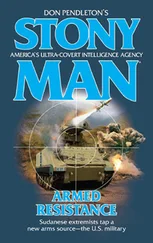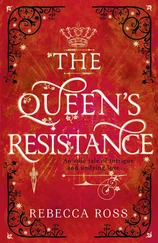“Seems like you’re a sought-after lad,” he’d said, referring to Atkins’s previous visits. “Not surprised really. Wheels within wheels at the moment, and all of them in motion. We’re bound to land on the same chap now and then.”
It was best for George, for everyone, the man explained, if he didn’t tell Atkins anything about this. Nothing at all. “This” was a long, narrow wooden case lying on a tree stump between them with an adapted Enfield Mark IV sniper rifle and telescopic sight inside it. “Designed up at Coleshill,” the man said as he’d lifted it out and fitted the thick, dark silencer.
Had George ever fired a gun before? Shotguns? Good. The man spoke with the same directness as Atkins, but never broke it with a smile like Atkins did. Everything he said seemed carved from the air. Precise and exact. He’d brought a bag of apples on which he’d asked George to practise, balancing them on fallen trunks and the lower branches of the trees.
“One thousand, two thousand, three thousand, four thousand, and …” The rifle had bruised George’s shoulder that first time. It was, however, as the man had promised, almost totally silent. Just a sharp rush of air and then an apple bursting in the distance when he hit, or white sparks of wood spinning off a branch when he missed.
“I know this is a heavy duty,” the man had said to George as he’d dismantled the rifle and packed it away in the case. “But I’m convinced you can handle it. It’s vital, after all, that the local population understand. Collaboration is simply not an option.” He’d paused slightly, clicking the lid of the case shut, and looked up at George. “It will not, in any circumstances, be tolerated.”
George never saw the man again, but what he’d said in the wood that day had stayed with him ever since. He’d practised with the rifle regularly, just as the man had told him to, aiming at the pencil dot on his bedroom wall and counting in his head up to the squeeze of the trigger. But then when the invasion finally came, four years later than when Atkins and the man had told him it would, they’d been occupied and it had got too dangerous. After he’d seen his mother sitting on the trough in the yard, weeping, his father’s hand on her shoulder, he’d hidden the rifle under the manure heap and the man’s words under his fear. By the time he’d gained the courage to confront them again, he didn’t know where to begin. There was collaboration of a kind everywhere. Should he shoot his own sister? His father for selling the Germans food? The policeman who’d replaced Constable Evans, who went on his rounds accompanied by a pair of Wehrmacht privates? The man’s words, however, never left him, and because of them George knew he was “perishing in the common ruin” rather than accepting his duty. He had abandoned the position that had been his to hold. But it was not too late. If the rumours, however fragile, of a Canadian and Free British assault were true, if the occupation might be overthrown, then he could still contribute. He could still play his part, however small. And that’s why, after what he’d seen at the show in Llanthony yesterday, he’d woken before dawn this morning and dug out the rifle from the manure heap. And why he’d then cycled to the edge of the Olchon before walking up to here, a coppice high on the valley’s eastern wall overlooking Maggie’s farm on the opposite slopes below him.
A brief flash of sun from the farmhouse focused George’s attention. Shutting one eye he peered through the sight again. Nothing. A window was open on the upper floor of the house, catching the sun as it swung in the breeze, but nothing else. His eyes were grainy with tiredness. The birds sang in the trees above him. A jay landed on a nearby branch, stripes of electric blue streaking each wing. It looked at him for a moment, then flew on again. The twigs and undergrowth below him dug into his stomach and forearms. He wished he’d had something to eat before he left.
Half an hour later George finally saw someone moving in the yard of the farm. No more than a shifting of shadows, but somebody was certainly down there. He looked through the sight once more and traced Maggie through them as she led the yearling colt out of the yard and through the small orchard of apple and pear trees. It was certainly her, and the horse, which still had one of its hind legs bandaged, was definitely the same yearling he’d seen run at the show ground yesterday.
George had watched Maggie and Alex descend the Hatterall ridge from where he’d been sitting on one of the priory’s ruined walls overlooking the show. It was the yearling’s red bandages that had first caught his eye, as clear as autumn hawthorn berries against the green and beige of the summer hillside. Had it not been for his encounter with Albrecht when he’d tried to deliver those letters to the Olchon several months earlier, George would have thought little more of it. But those returned letters with those words written across their addresses had been hard to forget; as had the offhand way the officer had told George, “There is no one left in that valley.” And yet now here was a woman and man bringing a horse over the Hatterall, the angle of their arrival suggesting they could have come from nowhere else but the Olchon.
George watched them make their way down through the lower fields, over the stream, and then past him towards the show ground. They stopped before they reached the outer tents, and the woman dismounted, handing the reins of her mare to the man, then leaving him with the horses while she walked on towards the secretary’s tent. By then, however, it had been just the man George was watching. He was certain he’d seen him before. He couldn’t think where exactly, but there was definitely something about him that snagged in his memory. The way he carried his head, his height, the prominent jaw, the impassive expression of his angular face, even his nervous blinking. George dropped off the wall and moved a little closer, walking up the slope behind him so as not to draw attention to himself. Had he seen him at the station, perhaps? Or at the market in Abergavenny or the sheep sale in Longtown? Then he remembered. The staff car with markings he didn’t recognise back last November, shrapnel damage denting its left wheel arch. He’d seen it driving through Pandy, two or three weeks after the first troops arrived. This man had been the driver of that car. His hair was longer now and he wore a farmer’s jacket and cap instead of a soldier’s tunic and helmet, but George was sure of it. This was the same man. He moved nearer again, trying to see his face as he stood between the two horses, looking over the show ground. A steady stream of people were coming through the main entrance, others were milling about the newly erected stalls and tents, but up here beside the priory, there was no one else around.
Suddenly the Tannoy system crackled into life. “Testing, testing. Good morning everyone. One, two, three …” The yearling colt reared its head and spun away from the man, pulling the lead rope out of his grip. Grabbing at the trailing rope, he’d pulled it tight, bringing the young horse back to him while still holding the reins of the mare. “Shhh,” he’d said, bringing the same hand up to the yearling’s withers and stroking him under the mane. “Sshhh, halt schon ruhig, halt schon ruhig .”
George didn’t have to tell many people what he’d heard for the word to spread. Although he’d yet to discover any organised civilian resistance in the area, he still knew which men and women harboured nothing but resentment for the German occupation. There were some who had become more ambivalent, who secretly welcomed what the Germans had brought: a promise of peace and a chance to get back to their prewar lives. But even among these people, there were levels of tolerance. And then there were those few at the other end of the scale who took it upon themselves to openly challenge the occupiers, within the bounds of safety, whenever they could. The chief judge in the cob ring was one of these men. A well-heeled farmer originally from up near Penderyn, he’d taken the cases of his workers and their families to the local commandant’s office and fought hard for their rights on several occasions. And there were others too, in the crowd, at the edges, to whom just a nod and a whisper had been all that was needed, so that an hour later, at the end of the yearling cob class, George was able to watch with fascination as Maggie Jones led her colt out of the ring in last place and almost total silence.
Читать дальше












